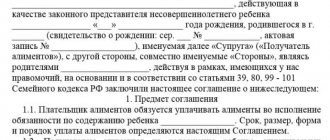When it comes to repaying unpaid debts, you sometimes have to face many difficulties. This may be due to the financial situation of the debtor, his dishonest behavior, or concealment of his income and property. However, sometimes the impossibility of paying debts does not depend at all on the actions of the debtor. Is it possible to collect funds in the event of his death, and how to do this, we will consider in this article.
Legislative framework for loans of the deceased
Entry into inheritance occurs within 6 months from the date of death of the testator (Article 1154 of the Civil Code of the Russian Federation). The rule applies to applicants of the 1st line of kinship. For other heirs, other deadlines are provided.
During this time, a person must submit an application to a notary or perform the necessary actions that confirm the actual acceptance of the property. After six months, citizens receive their due shares of the inheritance and the debt obligations of the testator. If there are two or three heirs, then they are jointly and severally liable to creditors (Article 1175 of the Civil Code of the Russian Federation).
On a note! Obligations for debts to creditors arise for the heirs only six months after the opening of the inheritance (death of the debtor). Until they receive a certificate and register ownership, they are not the owners of the property.
Who pays the mortgage in the event of death?
If the main recipient of the mortgage passes away, the first thing you should pay attention to is the presence of insurance that protects life and health. If mortgage insurance is available, the need to cover obligations will be assigned to the insurance company. However, the rules only apply if the relevant risk has been included in the policy. Otherwise, the application for payment will be rejected.
Attention! If you have any questions, you can chat for free with a lawyer at the bottom of the screen or call Moscow; Saint Petersburg; Free call for all of Russia.
If there is no life insurance policy for a mortgage, or the situation is recognized as not insurable, but there are heirs, the closure of the debt is entrusted to them (Article 1175 of the Civil Code of the Russian Federation). These citizens have the right to refuse to transfer debts. However, in this case the person will have to reject the inheritance completely. Receive property after the death of the mortgage borrower, but the obligation cannot be waived.
If there are several heirs, the mortgage debt in the event of the death of the borrower, like property, is divided between them in proportion to their shares in the inheritance (Article 1175 of the Civil Code of the Russian Federation). It is noteworthy that the person is liable only to the extent of the value of the property received. The bank cannot demand from a citizen an amount exceeding the established parameters.
Attention
However, the responsibility for closing obligations is not always transferred to the heir. If the second responsible party to the agreement is a co-borrower, he will have to begin providing funds (Article 325 of the Civil Code of the Russian Federation). It is not possible to refuse responsibilities.
Non-inheritable debts
According to the law, not all debts are inherited by the relatives of the deceased. The inheritance does not include the rights and obligations of the testator, which are inextricably linked with his personality (Article 1112 of the Civil Code of the Russian Federation). These include:
- right to alimony;
- compensation for damage to health;
- administrative fines.
Obligations of this kind are canceled immediately after the death of the testator. But the rest of the debts are inherited. For example, utility bills, debt (loan) of a deceased relative, or unpaid taxes (Article 44 of the Tax Code of the Russian Federation).
Who will get the mortgaged apartment in the event of the borrower's death?
Property owned by a citizen passes to his heirs. First of all, you need to pay attention to the presence of a will. In it, the person records his will regarding the disposal of property. The peculiarity of the document is that it can even identify citizens who are not close relatives. Property can be transferred to any person. However, in this situation, dependents and minor children must be allocated a mandatory share (Article 1149 of the Civil Code of the Russian Federation).
If there is no will, the distribution of property will be carried out according to law. In this case, the property goes to relatives. In the Russian Federation there are 8 lines of inheritance (Articles 1142-1145 of the Civil Code of the Russian Federation). The closer a citizen is to the testator, the higher the chance of receiving a mortgage apartment after the death of the borrower. So, the first stage includes:
- spouse;
- natural or adopted children;
- parents.
IMPORTANT
The above persons inherit first. If there are no representatives of the group, the opportunity to receive property will pass to the second or subsequent stages. In practice, there may be several heirs at the 1st level at once. In this case, property and obligations are divided between them in equal parts.
Do relatives pay debts for the deceased?
The law does not separate the property rights and obligations of the testator. If the legal successors accept the inheritance, then the loans of the deceased person automatically pass to them. Citizens cannot accept part of the property and refuse the rest of the property. The inheritance is accepted at a time and in full (Article 1152 of the Civil Code of the Russian Federation).
The only way to avoid paying off someone else's debts is to renounce an inheritance. The refusal may be targeted or absolute. Methods of refusal - by default or by submitting an application to a notary (Article 1159 of the Civil Code of the Russian Federation).
On a note! Successors are liable to creditors solely within the limits of the value of the inherited property.
You can draw up documents to repay the loan debt of a deceased person after the expiration of the 6-month period. Until this time, the heirs are not the owners of the property, and therefore have no legal relation to the debts of the deceased.
The issue of debt repayment during the period of registration of inheritance remains at the discretion of the heirs. The lender has no right to demand early closure of the loan. However, it is advisable for the heirs to notify the lender of the death of the borrower. This will avoid the accrual of fines and penalties for late payments on the loan.
Lawyers recommend that heirs take the following steps:
- find a loan agreement and find out the amount of debt;
- make a request to BKI. The procedure for resolving the issue legally is carried out through a notary. Therefore, legal successors will first have to submit an application for opening of inheritance. Contacting the Bureau will allow you to find out about available loans and the organizations in which they were issued;
- send to the bank a notarized copy of the death certificate and a certificate from the morgue.
If necessary, successors can agree with the creditor to repay the loan before the actual entry into inheritance rights.
Difficult situations when a person died, there was a loan left
When several people become heirs at once, their responsibility for paying debts becomes collective. In turn, the bank can now choose who to submit a request for payments to - all at once, or someone specific (of course, limited to the value of the inherited property). A common example of such a situation is when an apartment remains, and the ownership rights to it are shared; then the new owners will be forced to repay the loan for the apartment in the same shares in which they own it.
Are there situations when a bank prevents you from entering into inheritance rights? Yes, if the loan is secured by collateral (loan for a car, for an apartment). The fact is that, although both the debt and the collateral are inherited at once, the organization issuing the loan has the so-called “priority right” to force the heir to pay off the debt with the help of a pledge - therefore, entry into the inheritance is delayed until the disputed points regarding the debts of the deceased are resolved.
Cases where the inherited loan was issued under a guarantee certified by third parties are considered especially difficult. One of the important criteria here is: can the deceased person who took the loan be called conscientious? If so, and the person paid the debt on time, the remaining financial obligations will pass to the relatives who have entered into inheritance rights (the credit institution will not be interested in involving guarantors in the matter). If not, the person evaded payments, and shortly before his death a court order was already passed to collect funds for the debt, including from third parties who guaranted, then alas: responsibility for the debt passes to the guarantor.
However, having paid the debt obligations, the latter has the right to demand the same amount from relatives who have entered into the right of inheritance. He paid for the deceased, and the heirs will pay him: the legal lexicon calls this a “recourse claim.”
Limitation periods
The general limitation period is 3 years (Article 196 of the Civil Code of the Russian Federation). The countdown begins from the moment the creditor learned of the violation of his rights and the identity of the defendant in the claim.
The statute of limitations for the claims of the testator's creditors is not interrupted, canceled or suspended. Consequently, the lender can make a claim within three years from the date of arrears on the deceased’s loan, and not after the death of the debtor. Reinstatement of missed deadlines is not allowed (clause 59 of the Resolution of the Plenum of the Armed Forces of the Russian Federation dated May 29, 2012 No. 9).
Heirs also need to take into account the clarifications of the Supreme Court:
- The death of the debtor is not grounds for early repayment of the loan. For example, if the borrower had no delays, then the heirs can continue to repay the loan in accordance with the agreement;
- the amount of the loan issued to the borrower for personal or family needs can be returned by the heirs ahead of schedule. However, you must notify the bank about depositing money at least 30 days before the payment date, unless the agreement specifies a shorter period.
Mortgage Inheritance
A citizen has the right to independently determine his heirs. To do this, a will is drawn up. Chapter 62 of the Civil Code of the Russian Federation is devoted to the document. All the features of paper design, its legal force and nuances of application are defined here. However, in practice, a person may not have time to identify heirs. In this case, the procedure for transferring property after the death of the owner will be carried out in accordance with the provisions of Chapter 63 of the Civil Code of the Russian Federation. A legal act defines the rules of inheritance by law. They must be observed, including when receiving mortgage obligations and an apartment for which the debt has not yet been paid.
If a person claims part of the property and is ready to pay off the debt for the testator, it is necessary to contact the notary office located at the last place of residence of the property owner or location of the property. The procedure must be completed within 6 months. The period begins to be calculated from the moment of death of the testator.
The notary will read the citizen’s application, examine the documents confirming the relationship and the fact of the death of the testator, and then open the corresponding case. After 6 months, all heirs who contact the specialist will receive certificates confirming their right to property. Based on the document, it will be possible to re-register the property.
Attention
If a person plans to receive the property of the testator and is ready to repay the mortgage after the death of the borrower, it is necessary to begin interaction with a financial organization immediately after the death of the main borrower.
The procedure will be performed according to the following scheme:
- A citizen notifies a financial institution about the death of a mortgage borrower. You must provide supporting documents.
- The bank is introducing a moratorium on interest charges. The organization does not have the right to apply sanctions for 6 months (Resolution of the RF Armed Forces No. 9 of May 29, 2012). This period is necessary for registration of inheritance.
- When the established period has ended and the successor has received a certificate of inheritance, the person contacts the bank and transfers the debt to himself.
- The financial institution is preparing an additional agreement. The documents record the amount of remaining debt, the amount of overpayment, the timing of mortgage payments and the procedure for closing obligations.
Cases of inheritance of a loan by an insurance company
Many banks issue loans for the purchase of a car or apartment, provided that insurance is taken out. Having a policy is a guarantee of money back in the event of a person’s death. However, insurers do not always cover losses. A complete list of insurance risks is contained in the contract.
Insurance case
The heir needs to carefully study the provisions of the insurance policy. The document must contain an exhaustive list of cases covered by insurance. For example, the death of the insured person from illness, accident or illegal actions of third parties. If there are grounds, you should immediately contact the insurer.
What should an heir do when insuring a loan?
If the insurance policy has not expired at the time of the testator’s death, then the heirs need to prepare documents and submit an application for payment to the insurance company. The package of documents for obtaining insurance depends on the selected organization. Details can be found on the insurer's website.
If the decision on the application is positive, the insurance company will transfer the amount specified in the agreement to the bank to repay the loan.
What if the heirs do not know about the existence of an insurance policy? Legal successors can study the loan agreement or make a request to the BKI. This will allow you to find out where the testator took the money. Then you can make a request to the bank about all the companies with which it works or contact all insurance organizations in the city.
Transfer of debt to heirs
So, we are done with method 1 - transferring the debt to the heirs. Let's summarize briefly:
pros
- Cheap. You will only need to pay court costs and government fees. duty. Well, hire a lawyer who will go to court for you in the next year or two. An alternative option: if the debt has already been settled, the lawyer will kick the bailiff so that he at least somehow moves.
Minuses
- Energy-intensive. With all due respect to the servants of the law, in order for the bailiff to do something, he needs to be reminded of it. Better yet, pester him specifically. At least if you want to return the money.
- Low efficiency. The powers of the bailiff are limited. If a couple of days before death the debtor transferred all the property to the spouse, it will be almost impossible for the bailiff to return this property. Such transactions, of course, are contested on general civil grounds, but the practice there is very varied and it is not a fact that you will be lucky.
- A bunch of pitfalls. Starting with how to find the debtor’s property and ending with the fact that heirs can actively resist the loss of received assets - but we’ll talk about this below. Now something else is important: you will have practically no mechanisms for quick and effective counteraction - you will have to defend yourself either through court petitions or by obliging bailiffs, and they are not very eager to take on additional burdens.
- Loss of value. Until the heirs are announced and all the trials are completed, it will take from a year to 3 years. During this time, anything can happen to the debtor's former assets.
Now let's talk about the second way to return debt from a deceased person - through bankruptcy of an individual.
Possible exemption from insurance obligations
The insurer is released from obligations under the contract in the following cases:
- suicide;
- a chronic disease that was diagnosed before the policy was issued;
- death during extreme sports;
- death in prison;
- death as a result of hostilities;
- death due to a nuclear accident;
- the insurance has expired.
A complete list of exclusions from insured events is contained in the policy.
Only the heir or beneficiary specified in the contract can apply for payment of insurance compensation.
Practice analysis
In general, if you have not yet understood why an expensive and managed bankruptcy of a deceased citizen is better than a protracted and almost free transfer of debt to his heirs, then we give a specific example:
Oleg acted as a guarantor for his business loan. The business couldn’t bear the burden and the creditor filed a lawsuit to recover 17 million rubles from Oleg. In general, it is quite possible to fight off a guarantee (see the article “How to avoid paying a loan as a guarantor”), but Oleg did not follow this path.
The writ of execution was sent to the FSSP, but during the execution process it turned out that Oleg had died. And since he died, then the heirs will be responsible for the debts. But let us remind you here that the heirs are liable for the debts of the deceased only in the amount of the inherited property.
As a result, the bailiff suspended the proceedings and went to court to replace the defendant - to name the heirs instead of Oleg. And then it emerged that Oleg had much less property than debts. As a result, instead of 17 million, the court decided to collect the debt from the heirs in the amount of 2.7 million.
The loss, let's say, is tangible. But the creditor did not give up.
Natalya and Maxim came onto the stage and bought the right to claim the debt to Oleg from the creditor. On this basis, they are going to be included in the bankruptcy procedure of the deceased Oleg, which was introduced earlier at the request of his other creditors. And speaking in legal terms, it means bankruptcy of the hereditary estate. Moreover, they are trying to get involved at all 17 and kopecks.
The trial court looked at this case and only included the amount set by the court of general jurisdiction in the amount of 2.7 million. The reason? Oleg died, which means the heirs must answer within the inherited share. The court has already made a decision for 2.7 lemmas, so that’s what you can try to get.
But Oleg’s “new” creditors did not stop there and filed an appeal. And then, lo and behold, the court decides to cancel the ruling of the first instance and includes the entire amount of 17 million. The explanation is as follows: in the bankruptcy case of the deceased, the issue of the amount of liability of the heirs is not resolved. The procedure is aimed at the bankruptcy estate of the deceased, and not against the heirs. Thus, limiting the amount of liability would violate the proportionality of satisfaction of creditors' claims.
What's interesting about this case is that it went all the way to the Top. And there they agreed with the arguments of the appeal.
So, 17 versus 2.7 million. Bonus: the opportunity to challenge Oleg’s transactions to alienate his assets over the past 10 years. Now do you understand the main advantage of bankruptcy?
What to do if the creditor asks to urgently repay the loan of the deceased
The bank may require you to repay the loan early. The lender usually refers to the long period of delay and accrued fines. However, such demands are unlawful.
The heir may provide a death certificate of the borrower and not communicate with bank employees until he assumes inheritance rights. After registering the inheritance, you can continue to pay the loan, restructure the debt, or repay the loan early.
Do banks have the right to demand fines and penalties from heirs after registration of an inheritance? In this case, the bank’s actions will be legal. However, it is worth paying attention to the size of the penalties. It may be advisable to raise the issue of reducing the amount.
How does the bank know that the borrower has died?
The bank becomes aware of the death of the loan borrower when there is a delay in repayment: for large banks this can even happen 2 or 3 months later. As soon as the debtor stops communicating, credit managers come into play - they contact employers, relatives, and other available contacts leading to the debtor. At the same time, while the “search work” is ongoing, the bank continues to charge interest on the debt and fine for non-payment.
If bank representatives insist on early repayment of the debt, they have to turn to the courts. For relatives of the deceased, there are some simple tips on how to act in such circumstances.
Funeral benefit
Is a car loan inherited after death?
Any debt obligations pass to family members of the deceased borrower, provided that they enter into inheritance rights. Car loans are no exception.
If you have a CASCO policy, the loan debt can be repaid using the insurance payment. If the loan was not insured at the time of the borrower's death, the heirs can accept the property and repay the loan according to the schedule or sell the car and pay off the debt. In case of refusal of inheritance, the borrower's property will go to the bank.
When does the bank pay the mortgage after the death of the debtor?
The bank will not write off or independently pay off the mortgage for a client after death. If there are no co-borrowers, the situation is not recognized as an insured event, and the heirs refuse to receive obligations, the financial organization initiates legal proceedings, during which they consider the possibility of selling the apartment and using the proceeds to pay off the mortgage debt. In most situations, the company's requirements are satisfied. As a result, the apartment will be sold, and the proceeds will be used to pay off the debt.
How to avoid paying fines and interest after the death of the borrower
You cannot avoid paying interest on a loan. But you can reduce the size of the penalty (Article 333 of the Civil Code of the Russian Federation). The heir will have to go to court and prove that the amount of the accrued penalty is not commensurate with the consequences of violating the obligations under the contract.
Penalties can be avoided by promptly notifying the creditor of the death of the testator.
If desired, the successor may refuse to accept the inheritance. In this case, the obligations of the deceased will not pass to him.
What ambushes?
Above we wrote everything well and smoothly. In fact, there are a lot of problems with collecting debt from a deceased person. Here are the main ones:
The debtor withdrew the property
Vasya knew that he did not have long left and before his death he scattered his property among his family and friends. Here is the topic of our article: “How to easily find the debtor’s property.”
There would be no problems if bankruptcy had already been filed, or the debt had at least been settled. The transactions would be contested and the property would be returned to the bankruptcy estate. But in our situation there is no debtor, there is no property, and therefore there are no heirs - therefore there is no one to transfer the debts to. The debt collection case is terminated.
What to do? In this case, you need to go to a court of general jurisdiction again and, referring to precious Art. 10 and 168 of the Civil Code, try to challenge property disposal transactions: it will take a year or two, it will require a lot of nerves and money for lawyers, and the chances of winning will be around 20-30%.
The second option: come to Igumnov Group and we will close this issue in 6-9 months with a 90% guarantee, provided that no more than six months have passed since the death of the debtor. We know how to solve such problems because we know how to find holes in the law. And they are here. So, for anyone interested in settling the debt of a deceased person who has nothing, contact us here. Our services are not cheap, but when more than one million is at stake, the costs will be worth it.
Heirs
Let's imagine that the creditor received satisfaction of his claims at the expense of the inheritance. And then one day, the heirs of the first stage showed up, who did not know about the death of the testator. Or heirs who have the right to an obligatory share in the inheritance. Or, on the contrary, someone was recognized as “unworthy heirs.” In general, you get the point - the story can drag on forever.
What to do? The solution to the problem is still the bankruptcy of the deceased citizen. Unlike a court of general jurisdiction, in the event of bankruptcy, all cases will be considered within the framework of the bankruptcy case and according to the provisions of the bankruptcy law. And as we wrote above, there are more ways to maneuver. In addition, between you and the heirs there will be a buffer in the form of a financial manager - if anything goes wrong, this will be his area of responsibility.
The only housing
It so happens that the only property left after the debtor is housing. But housing can be a one-room apartment near Murmansk or a mansion in Sochi. In this case, what this housing means to the heir will play an important role. If during the life of the debtor this was not his only home, but for the heir it will become so, it will not be possible to claim it - it is not allowed.
What to do? But it is necessary to require the heirs to pay the debt in cash within the inherited share. If the debt is 50 million, and the housing cost 20, then you can demand to pay 20. Another thing is that the heir is not guaranteed to have that kind of money. But no one is stopping the heir from going bankrupt.
Heir's creditors
So, our Vasya died, but the creditor is calm. Vasya had property, which means he was definitely not in trouble. But here’s the problem - the only heir is himself in bankruptcy and accepts the inheritance. Because he has no other option.
We examined this question in more detail in our monthly column “Answer to a Reader’s Question.”
We have already sent subscribers to our newsletter an analysis on the topic “should a bankrupt person accept an inheritance?” In order not to procrastinate on the topic of the 10th circle, leave your email below and we will duplicate the letter for you:
In short: the refusal of a bankrupt heir to enter into an inheritance will be considered an infringement of the rights of his creditors. As a result, the refusal of the inheritance will be challenged, and the testator’s property will be included in the heir’s bankruptcy estate. Therefore, the bankrupt heir will have to accept the property in any case.
Now the picture from the creditor’s side: let’s imagine that Vasya’s debtor has 5 million worth of debts and 30 million worth of property. The picture is excellent: while the creditor is guaranteed to get what he deserves, and what’s more, it remains for the heir.
But only the sole heir files for personal bankruptcy. And he has debts worth 70 million, and property worth 2. When he accepts the inheritance, the picture will be as follows:
- property: 30 2=32 million
- debts: 5 70=75 million
As a result, Vasya’s creditor with his 5 million debt is included in the register of the heir’s claims and shares his property with all other creditors. It will be lucky if in the end he returns at least 50% of the debt amount.
And if you imagine that the heir’s creditors are also “friendly”. Then, with a greater degree of probability, Vasya’s creditor will be left to suck his paw.
What to do? As we wrote above, the best option for the creditor is to bankrupt the deceased debtor. In this case, the debts of our creditor will be repaid first, and the rest will be thrown to the mercy of the heir and his creditors.
Statute of limitations
Let’s imagine a situation where a creditor delayed filing an application with the court until the last minute. The logic is clear - you don’t remind the debtor about the debt for a couple of years and wait until he has money.
The debtor calms down, thinks that he has been forgotten and lives his prosperous life. And then the execution lands on him. production, seizure of accounts, and all this in the company of a bailiff - in general, drawn-out revenge. By the way, banks like to use this method to address malicious defaulters.
Now let's count.
Our lender also decided to delay. He went to court to collect the debt in court exactly by the end of the 3-year period. And then it turns out that the debtor just recently died.
By delaying filing a claim in court until the final days, you may miss the 3-year statute of limitations. Because the death of the borrower does not suspend or interrupt the course of the term. And if he died before you submitted your application, then by the time you figure out who the heir is and who you need to ask, 3 years will easily pass. That's how we made it through.
What to do? First we run to the common fund, in an attempt to judge the inherited property. If the deadlines fly by, we try to restore them. By the way, our team has a master at juggling the statute of limitations. You to her.
Can banks transfer debt to collectors?
Any bank has the right to transfer a person’s debts to third parties, including a collection agency. This occurs by concluding an assignment agreement (Article 382 of the Civil Code of the Russian Federation). The possibility of assigning the right of claim is usually specified in the loan agreement. The debtor's consent to transfer the creditor's rights to third parties is not required.
The only condition is that the new lender must have a banking license. Otherwise, the debtor’s consent will be required to transfer the creditor’s rights to another person. (Determination of the Supreme Court of the Russian Federation dated May 14, 2019 in case No. 67-KG19-2).
If the loan agreement does not contain such a clause, then the lender does not have the right to assign the borrower’s debt to third parties without his consent.
Bankruptcy of a deceased citizen
Considering how many articles we have written about bankruptcy, we can at least conclude that this story is more labor-intensive. And complex. And darling.
But the chances of getting yours are much higher. Precisely due to the ability to challenge transactions, the running of the statute of limitations and, most importantly, the powers of the financial manager.
So, the algorithm for bankruptcy of the deceased is as follows:
Step 1. Argue your claims against the debtor in a court of general jurisdiction. The presence of a court decision that has entered into legal force on the collection of a debt in the amount of more than 500,000 rubles is a mandatory requirement for introducing bankruptcy in relation to an individual. An exception is made only for banks and for alimony - these creditors can do without a common fund.
Step 2. Next, the situation can develop in different ways - depending on how Vasily feels. If the debtor has already left this mortal coil, then we follow algorithm No. 1 (claim against inherited property) with all the ensuing problems. To the point that if Vasily does not have heirs and property, then the case of debt collection will be terminated. In practice, this means that the creditor can forget about both bankruptcy and his money.
If our creditor managed to receive the court decision before Vasily died, then we immediately move on to the next step.
Step 3. After receiving the court decision, we file an application for bankruptcy of an individual to the Arbitration Court. The application must indicate that the debtor has died - this is important. And be sure to nominate a reliable, professional and highly paid financial manager, who will now work instead of you and for your benefit. And of course, for your money.
Step 4. The court introduces bankruptcy proceedings. The financial manager collects information about the debtor’s property, transactions involving the withdrawal of his assets over the past 10 years, and open inheritance cases.
Step 5. If the inheritance case has not yet been closed, then the FU waits for the formation of the final list of heirs. At the same time, transactions “donating apartments worth 120 million to daughters 4 days before death” are being disputed, requests are being sent to depositories and other property of the Debtor is being sought.
Step 6. After all the property is collected in one pile, the heirs are invited to participate in the bankruptcy case as a third party. In practice, this means that they can watch from afar as assets that should belong to them are sold off, and the proceeds from the sale are transferred to the hands of creditors. This is usually a very sad picture.
Step 7. If, at the end of the auction, all creditors’ claims are satisfied, the remaining money will be distributed among the heirs. But we have not yet seen such a miracle.
As you can see, the key point for bankruptcy is the settlement of the creditor’s initial claims against the debtor. If you delay with this matter, there is a high chance of being left in the dark. If it later turns out that the debtor withdrew all assets during his lifetime, then the claim will be dismissed, because no inherited property. And there is no inheritance, which means there is no one to accept the debts.
pros
- Probability of success. Considering that in the event of bankruptcy, all the debtor’s property is included in the bankruptcy estate, the likelihood of satisfying the creditors’ claims is much higher.
- More possibilities. In the bankruptcy procedure, the terms are different, and transactions can be challenged on special (bankruptcy) grounds, and “friendly” creditors can be knocked out of the register.
- Control over the procedure . The entire procedure takes place in one case in the Arbitration Court. This means that instead of running to 10 different courts, you will need to contact one. Another bonus - whoever initiates the bankruptcy procedure will be able to appoint an arbitrator.
Minuses
- Expensive. Payment for the procedure, lawyers who will handle the case. Don’t forget about the financial manager and going to the meetings themselves - in general, this is not the most budget-friendly idea. Considering that on average a similar project takes plus or minus a couple of years, it makes sense to start if the debt starts at least 5 million.
- Ambiguous . The bankruptcy law has a lot of ambiguous points that each party can interpret as they wish. And here bankruptcy legislation intersects with family legislation, which is generally far from ideal. Accordingly, the final result largely depends on the qualifications of the lawyers of the opposing parties and their ability to convey to the court their interpretation of the law.
One example of how we do this is described in the article “Limitation period for subsidiary liability.”
How not to repay a debt
The only way to avoid paying off someone else's debts is to refuse an inheritance. It is advisable for heirs to renounce property rights if the amount of debt exceeds the value of the identified property. However, the heir will no longer be able to change his decision. The notarial refusal is irrevocable.
If the loan debt is small, then it is appropriate to enter into inheritance rights and close it. You can estimate the approximate value of an asset yourself or by contacting an appraisal company. For example, if you need to find out the value of a property, business or copyright.
In case of refusal to accept the inheritance, citizens will not be able to freely use the apartment. The debt will be repaid using the identified property. The relatives of the deceased person will have to leave the apartment. The exceptions are young children and disabled parents. The lender has no right to evict them. However, it is necessary to take into account the circumstances of the case (Determination of the Armed Forces of the Russian Federation dated 06.08.2013 No. 24-KG13-4).
What if the debt is already outstanding?
If the debt is settled and Vasily died when, for example, enforcement proceedings were already underway against him, then in principle nothing changes - it’s just that all the same actions from the above algorithm are performed by the bailiff, and not by our creditor. And there will be some minor amendments:
- The bailiff must himself determine the circle of heirs and the value of the inherited property. To do this, he requests information from the notary in charge of the inheritance case and evaluates the assets,
- then the bailiff goes to court with a demand to change the defendant: from the deceased to the heirs,
- after replacing the sides in use. production, the bailiff collects the debt in proportion to the inherited share. If there are more assets than debts, the creditor is lucky, there is a high probability of receiving the entire amount of the debt. If it’s less, you’ll have to be content with what you have.
Obligations of guarantors and co-borrowers
When concluding a loan agreement, banks often involve co-borrowers and guarantors. They are jointly and severally liable for their obligations. For example, in case of default on a loan or death of the main debtor. The extent of liability is determined by the contract. Typically this includes repayment of the loan amount and accrued interest.
The debtor's spouse often acts as a co-borrower. The guarantor may be a third party. Repayment of the loan debt is carried out at the expense of the above-mentioned persons or through the sale of property.
The most difficult circumstances arise for unsecured loans. The inheritance goes to the relatives of the deceased person, and the loan debts will have to be repaid by the co-borrower and the guarantor. However, if the co-borrower is the spouse of the deceased, then he can pay off the debt using his share of the inheritance.
On a note! The guarantor has the right to present a counterclaim to the inheritance after paying off his part of the loan (Article 365 of the Civil Code of the Russian Federation). If the legal successors refuse to compensate for the losses of the guarantor, he may go to court.
You cannot pay more than the inheritance is worth
Indeed, after the 6 months required by law, if the relatives of the deceased have become legal heirs, the entire “volume” of the latter’s inheritance passes to them - including the loan debts left by them. The branch of law dealing with inheritance issues uses the concept of “universal succession” for this purpose. However, the financial liability of those who inherited the loan cannot exceed the total value of the inheritance they accepted.
You should pay attention to the following nuance: previously, banking organizations could, through the court, demand collection of only the remaining debt + interest on it, which was accrued on the date of death of the borrower. To date, a number of legislative amendments have been adopted that have expanded the rights of banks to claim interest accrued after death - be careful in this matter.
Additional questions
No. 1. How long does it take to accept an inheritance?
You can submit an application to a notary or take actions indicating the actual acceptance of the inheritance within 6 months from the date of death of the testator.
No. 2. When is it appropriate to refuse to accept an inheritance?
It is advisable to waive the rights and obligations of the testator if the identified property does not cover the debt obligations of the deceased. In other cases, it is worth taking over, selling the property, closing debts and taking the remaining funds.
No. 3. Is it possible to accept only part of the inheritance?
The law does not allow such manipulations. The successor must accept the inheritance at a time and in full.
No. 4. How to avoid paying a loan for a deceased relative?
If a relative accepts the inheritance, then the debts of the testator also pass to him. The only way to get rid of them is to refuse the inheritance. As for the amount of debt, it can be reduced through negotiations with the creditor and in court.
No. 5. Should relatives and heirs pay off the loan of a deceased person if he died on the last day of the insurance coverage?
If the insured event does not fall into the “Exceptions” category, then the insurer is obliged to pay compensation. That is, the heirs will not need to repay the loan. The insurance period usually ends at 24:00 on the date specified in the contract.
No. 6. Is it possible to revoke a refusal of inheritance?
If a refusal application has been submitted to a notary, then it can no longer be withdrawn.
Rights of the guarantor
Often one of the conditions for issuing a mortgage is the mandatory involvement of guarantors. Unlike co-borrowers, persons acting in this role cannot claim part of the property purchased on credit. However, guarantors bear full responsibility under the contract if the main recipient of funds for some reason can no longer continue to fulfill obligations (Article 363 of the Civil Code of the Russian Federation).
If the person who took out the mortgage dies, the possible consequences depend on the specifics of the situation. When the borrower changes and the heir begins to act in his capacity, the liability of the guarantor can be retained. Such measures are applied only if the person agrees to bear responsibility, or the contract states that it does not disappear even if the borrower changes.
IMPORTANT
In practice, a person may not have any heirs, or they have formalized a refusal to accept obligations under the mortgage and property. In this case, the property passes to the state. The guarantor has the right to refuse the obligations assumed.








